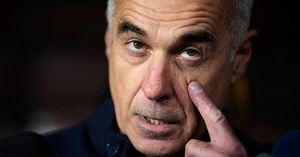The geopolitical chessboard has been buzzing with the unusual alignment of North Korea and Russia, especially as the conflict between Russia and Ukraine continues to escalate. Recent reports reveal significant developments, hinting at military cooperation between these two nations. The potential ramifications of this alliance reach far beyond their borders, affecting not just the immediate region but perhaps the stability of global politics as well.
On November 14, 2024, news surfaced about North Korea and Russia moving forward to finalize their mutual defense treaty. This treaty is set to mark the revival of their military alliance for the first time in nearly three decades. An official report noted the completion of domestic procedures for the Treaty on Comprehensive Strategic Partnership, which outlines mutual military support should either country face aggression. Speculations arise around the timing, especially as the results of the recent U.S. presidential election became known, stirring concerns over the international balance of power.
Kazusa Yoda, writing for The Yomiuri Shimbun, highlighted the significance of this treaty. By enhancing military cooperation, both countries aim to fortify their positions amid global uncertainties. Notably, North Korean leader Kim Jong Un and Russian President Vladimir Putin are expected to meet for high-level discussions when the treaty's ratification documents are exchanged. This strategic partnership signals not just military cooperation but potentially sets the stage for future confrontations with Western powers, especially the United States.
Adding fuel to the fire, U.S. Secretary of State Antony Blinken issued stern warnings about North Korea's military involvement. He articulated concerns during discussions with Ukrainian Foreign Minister Andrii Sybiha, explicitly noting how North Korea is aiding Russia's aggressions against Ukraine, which could have far-reaching effects on both European and Asian security frameworks.
"The fact is, the relationship between Russia and North Korea is a two-way street," Blinken stated at NATO headquarters. He denoted the potential outcomes of North Korean troops engaging directly against Ukrainian forces, which, according to him, signals increasing collaboration among adversarial nations like Russia, North Korea, and Iran.
It's not just rhetoric; intelligence reports disclosed the alarming deployment of approximately 8,000 North Korean soldiers to the region as Russia ramps up its military efforts. This troop movement coincides with Ukraine's offensive operations, indicating North Korea's readiness to engage militarily, marking the first large-scale combat operations for its forces since the Korean War.
Analysis from military experts suggests this alignment could denote North Korea's intent to be positioned advantageously should conflicts arise, using Russian support to bolster its own military capabilities and nuclear development. Observers are worried about the consequences of this collaboration not only for the immediate regions involved but also for global security levels, reflecting on how intertwined modern geopolitical conflicts have become.
Experts from the U.S. Institute for the Study of War voiced concerns over the potential transformation of North Korean forces as mere instruments on the battlefield, warning about potential casualties and the long-term impacts of being deployed as reinforcements for Russia. This narrative of North Korea serving as 'cannon fodder' is particularly worrying and highlights the desperation of both regimes as they seek to pursue aggressive military objectives.
Meanwhile, geopolitical analysts have pointed out the historical parallels with previous alliances, recalling earlier treaties between the Soviet Union and North Korea. For example, the Treaty of Friendship, Cooperation and Mutual Assistance established obligations for intervention during armed conflicts—an echo of sentiments seen today as North Korea and Russia find common ground once again.
Russia's ambitions are coupled with its strategic military objectives. The recent focus on securing the Kursk region as Ukraine prepares for more cross-border initiatives reveals both nations' desperate need to solidify their foothold before potential shifts under the incoming Trump administration take place. Reports suggest Russia is gathering forces, including North Korean troops, to drive out Ukrainian military presence.
The regional and global perspectives have shifted with these events. The Japan News reports how North Korea's involvement deepens the complexity of power dynamics, muting China's previously dominant role within the Korean Peninsula discussions, as it remains surprisingly quiet on this burgeoning alliance. The echoes of the new Cold War resonate across various regions as North Korea seeks to leverage this collaboration against U.S. presence and partnerships globally.
At the heart of these developments lies the urgent need for responding nations to recalibrate their strategies. Both Blinken and his counterpart from Ukraine agree on the intertwined fates of both the Euro-Atlantic and Asia-Pacific regions, emphasizing how North Korea's military actions impact not only local security but reverberate across continents.
With both Russia and North Korea emboldened by each other's support, the pace of military developments continues to worry analysts who foresee potential escalations. The intertwined nature of these conflicts brings to light the necessity for vigilance moving forward, as the alliances take shape and the threats they pose crystallize.
While President-elect Trump’s policies remain uncertain, the Biden administration is continuing efforts to bolster Ukraine's defenses, strategically using the time left to build stronger alliances and deter Russian advances. The outcome of such developments could define the effectiveness of global peace efforts, particularly amid these rising tensions.
Speculation looms over the ramifications of the re-emerging military relationship between North Korea and Russia, prompting observers to question not just the immediate impacts but the long-term strategic shifts these alliances might herald across the global stage. More than ever, the balance of power is fragile, with North Korea and Russia challenging the status quo at every turn.



